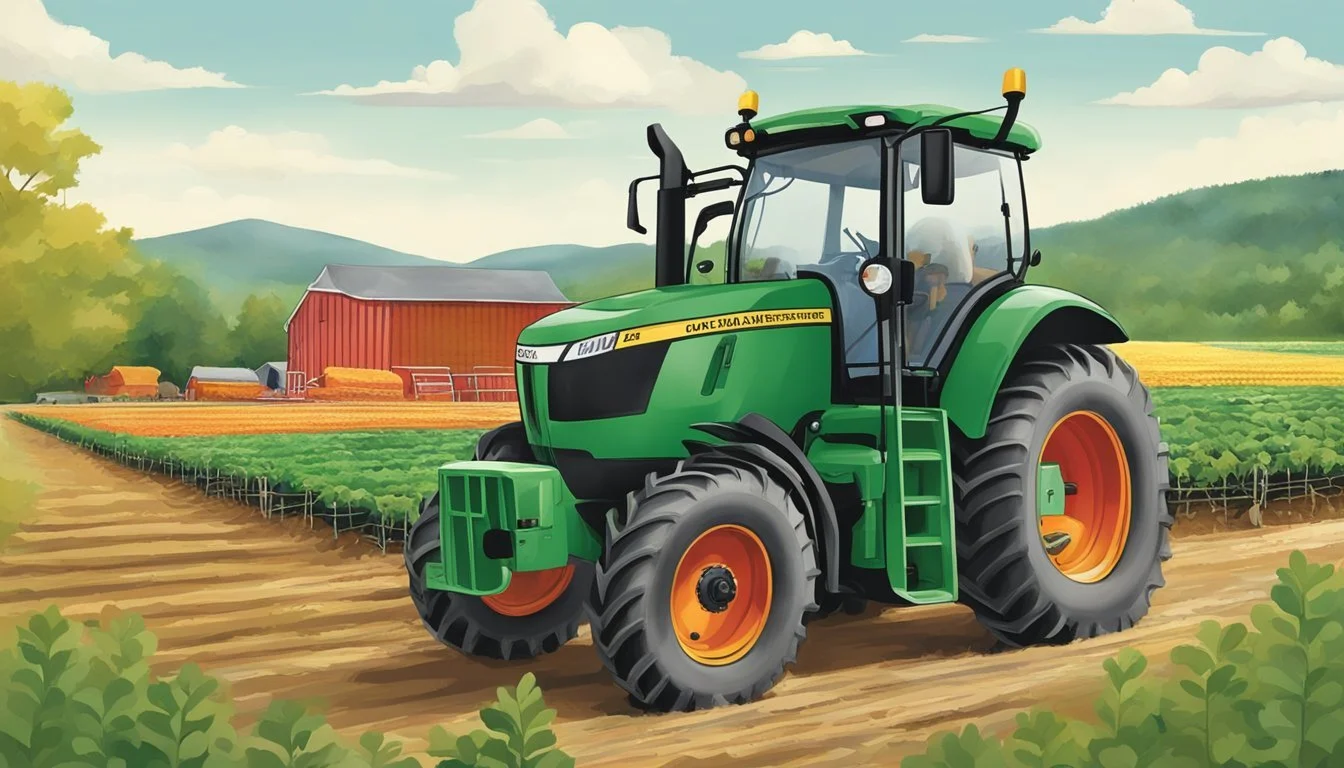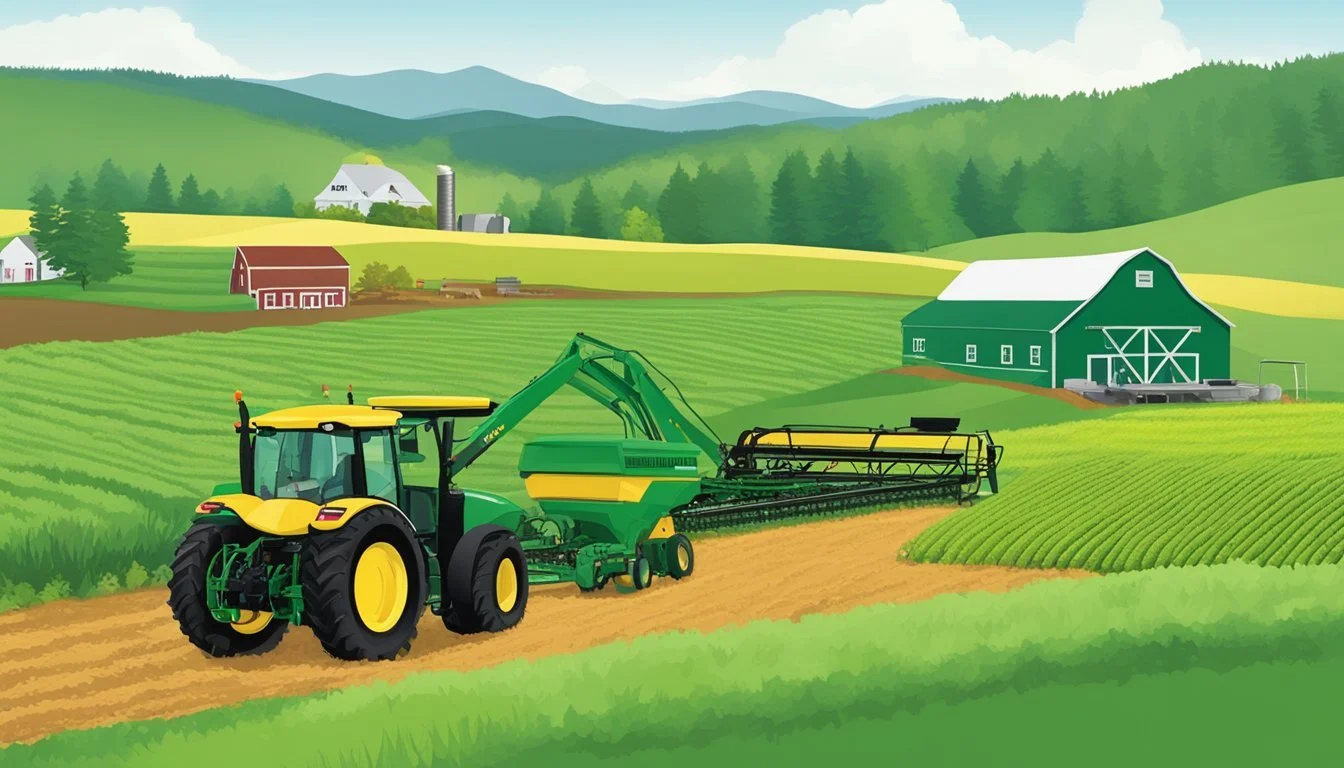Farming Grants New Hampshire
Securing Financial Aid for Sustainable Agriculture
New Hampshire's agricultural sector offers various grant programs to support its farmers and enhance the state's agricultural output. These initiatives provide critical financial assistance, addressing the diverse needs of the state's agricultural community from specialty crop production to sustainable management and COVID-19 relief. State agencies, in partnership with federal programs and private entities, tailor grants to reinforce the unique facets of New Hampshire’s agricultural landscape.
The New Hampshire Department of Agriculture, Markets & Food collaborates with the United States Department of Agriculture to allocate funds through programs such as the Specialty Crop Block Grant Program. Additionally, the Farm Future Fund, facilitated by the Cheshire County Conservation District, offers privately funded grants designed to secure the future of farming in the state. Another key source of support during challenging times is the New Hampshire Agriculture COVID-19 Relief Fund, which offers financial assistance to farms impacted by the pandemic.
Farmers can access various loan opportunities through the USDA Farm Service Agency's state programs that cater to farm sustainability and growth. Alongside loans, the Agricultural Management Assistance program and other cost-share initiatives provided through various services, sustain a myriad of agricultural activities in New Hampshire, ranging from soil health improvement to water quality and forest management. These programs collectively aim to fortify the state's agricultural sector, ensuring that New Hampshire's farmers have the resources they need to thrive.
Overview of Farming Grants in New Hampshire
New Hampshire offers a variety of grants to support the agricultural sector, focusing on enhancing the sustainability and viability of farming practices within the state. These initiatives are primarily facilitated through state agencies and can serve a wide range of farming needs including innovation, conservation, and development.
Grant Fundamentals
In New Hampshire, grants are designed to bolster the agriculture industry with financial assistance to farmers and agricultural organizations. Funding avails itself in several forms such as:
Development Grants: Financial aid targeted at the enhancement of specialty crops like fruits, vegetables, and nursery products, among others.
Conservation Grants: Funding to support projects aimed at preserving environmental quality and sustainability, which is crucial for long-term farming viability.
Eligibility criteria and the scope of the projects can vary, urging applicants to thoroughly review guidelines before submitting proposals.
Agency Resources
Key agencies provide the resources and assistance necessary for grantees to navigate the funding process successfully:
NH Department of Agriculture, Markets & Food (NHDAMF): This agency administers programs such as the Specialty Crops Grant Program, designed to improve the competitiveness of New Hampshire's specialty crops.
USDA: The United States Department of Agriculture offers broader support and grants that can be tapped by New Hampshire farmers, extending beyond state-specific programs.
These agencies are not only funding sources but also offer guidance and support to ensure the agricultural community has access to necessary information for grant application and project execution.
Types of Grants Available
New Hampshire offers diverse grant opportunities catering to the enhancement of its agricultural sector. Farmers and agricultural businesses can tap into programs that support sustainable practices and economic growth within the state's food system.
Environmental and Conservation Grants
The Specialty Crop Block Grant Program (SCBGP), facilitated by the New Hampshire Department of Agriculture, Markets & Food (NHDAMF), is funded by the USDA's Agricultural Marketing Service. It aids in fostering specialty crop agriculture, bolstering environmental stewardship.
Additional funding opportunities are tailored to support conservation easement projects. The NH Farm Future Fund focuses on farmland viability planning concurrent with the preservation of vital agricultural soils, thus safeguarding natural resources and promoting environmental health.
Business and Economic Grants
The Noninsured Crop Disaster Assistance Program (NAP) offered by USDA's Farm Service Agency (FSA) provides financial backing in the event of natural disasters, reinforcing the business resilience of farmers with noninsurable crops.
Nonprofits, businesses, and individuals in economically distressed communities can benefit from agriculture grants that catalyze community agriculture projects and research. These efforts collectively aim to bolster the state's food system, enhance farmland access, and secure the long-term viability of local agriculture.
Applying for Grants
Farmers in New Hampshire have multiple grant opportunities to support agricultural initiatives. To enhance their chances of securing funding, they must navigate through eligibility guidelines, proposal writing, and often may seek technical assistance.
Eligibility Requirements
Eligibility for agricultural grants in New Hampshire typically requires applicants to be involved in sectors such as fruit, vegetable, nursery, floriculture, herb, maple, Christmas tree, and honey crops. Prospective grantees should be part of an organization or entity based in New Hampshire, potentially having specific stipulations for the type of agricultural work such as sustainability practices or conservation efforts. The USDA often provides grants that necessitate compliance with federal agricultural standards.
Proposal Writing and Submission
Writing a compelling grant proposal involves clearly outlining the project objectives, relevance to specialty crops, and potential impact on the New Hampshire agricultural community. Proposals must be submitted by the specified deadline, with some grants requiring submissions as early as February or September. Submission can be digital or via hard copy, depending on the grantor’s requirements.
2024 Example Proposal Deadlines:
New Hampshire Farm Future Fund: February 15, 2022
State Conservation Committee Grant: Due date in September 2024 (exact date to be announced)
Other grants may have varying deadlines throughout the year.
Technical Assistance
Applicants may often seek technical assistance when applying for grants. Assistance can come in the form of training workshops, informational resources, or one-on-one guidance from specialists. These resources are designed to help farmers understand the grant process, meet all necessary eligibility requirements, and craft a persuasive proposal. Some organizations may offer support specifically tailored to USDA grant programs.
Federal and State Grant Agencies
State and federal agencies offer various grants that cater to the agricultural sector in New Hampshire, focusing on enhancing the competitiveness of specialty crops, supporting value-added products, and providing funding avenues for sustainable agriculture practices.
New Hampshire Department of Agriculture
The New Hampshire Department of Agriculture, Markets & Food (NHDAMF) provides opportunities for grants through programs such as the Specialty Crop Block Grant Program (SCBGP). This program is dedicated to advancing specialty crops within the state. Farmers can access application details and deadlines by visiting the NHDAMF's official website.
United States Department of Agriculture
The United States Department of Agriculture (USDA) supports a wide array of programs through its different agencies. Some key agencies include:
Farm Service Agency (FSA): Offers loans to farmers for farm ownership and operations.
Agricultural Marketing Service (AMS): Provides funding opportunities like the SCBGP that work in collaboration with state agencies.
Natural Resources Conservation Service (NRCS): Focuses on grants aimed at land conservation and sustainable farming practices.
Together, these agencies work towards fostering growth and innovation in the farming sector of New Hampshire.
Grant Funding for Specific Agriculture Sectors
In New Hampshire, targeted grant programs offer financial assistance to bolster sectors such as dairy, fruit and vegetable, and livestock and poultry production. These grants are designed to enhance the competitiveness and sustainability of these specific agricultural sectors.
Dairy Production Grants
Dairy Producers in New Hampshire can benefit from grants aimed at improving production efficiency and product quality. These grants may offer funding for equipment upgrades, adoption of innovative farming practices, and development of value-added products.
Fruit and Vegetable Grants
Grants supporting Fruit and Vegetable production focus on a variety of initiatives, from crop research to market expansion. Entities such as the Agricultural Risk Coverage (ARC) program may also provide funding to assist fruit and vegetable growers in managing revenue risks associated with sudden price and market downturns.
Livestock and Poultry Grants
Livestock and Poultry sector grants in New Hampshire are geared towards enhancing animal health, food safety, and environmental sustainability. They may cover the costs for infrastructure improvements, disease prevention, and compliance with regulatory standards.
Agricultural Education and Training
The state of New Hampshire actively supports the agricultural sector through various educational initiatives designed to enhance farming knowledge and leadership skills.
Educational Workshops and Seminars
Farmers in New Hampshire have access to a range of educational workshops and seminars aimed at enhancing their agricultural expertise. These educational events are typically funded by grants and are intended for a wide array of participants, from seasoned professionals to newcomers in the farming industry. Workshops may cover topics such as sustainable farming practices, crop management, and the application of new agricultural technologies.
Stewardship and Management Training
In addition to workshops and seminars, there are training programs focused on stewardship and farm management. These programs are essential for farmers who are looking to improve their land's productivity and sustainability. They often include hands-on training and are designed to impart knowledge on best practices in soil health, water conservation, and overall farm efficiency.
Entities Involved:
Education: Schools, non-profit organizations, and government agencies play a crucial role in providing educational content geared towards agricultural improvement.
Training: Training sessions are provided to ensure that farmers and agricultural workers can continue to develop their skills and adapt to innovative farming methods.
Workshop: Interactive workshops serve as platforms for knowledge exchange, where attendees can learn from experts and peers alike.
By investing in education and training within the agricultural sector, New Hampshire is building a robust foundation for the future of farming. These initiatives not only support individual growth but also contribute to the overall advancement of the state's agricultural community.
Agricultural Business Development
New Hampshire's agricultural sector recognizes the critical role of business development in enhancing the competitive edge of its farms and food enterprises. Two key components that drive agricultural business development are market access and distribution, and product processing and food safety.
Market Access and Distribution
New Hampshire's Department of Agriculture promotes strategies to advance local farms and food businesses by improving market access and distribution channels. Grants and programs are designed to directly benefit producers and indirectly strengthen the state's food system infrastructure. The aim is to expand processing, aggregation, and distribution capacities, thereby allowing farmers a broader marketplace to sell their products and a more efficient system to reach consumers.
Product Processing and Safety
Product processing is an integral component of the value chain that adds a premium to agricultural products. New Hampshire offers targeted financial support and technical assistance for farms to enhance their product processing capabilities. This not only includes the physical processing but also a strict adherence to food safety standards, ensuring that products meet regulatory requirements and consumer expectations for quality and safety. The state's approach supports business development by enabling producers to safely transform raw goods into market-ready items, thereby adding value and creating opportunities for growth.
Land Conservation and Stewardship
In New Hampshire, land conservation and stewardship initiatives operate to preserve farmland and natural habitats, ensuring sustainable management of natural resources for future generations.
Farmland Preservation Initiatives
Land Trusts and organizations such as Land for Good play a crucial role in securing Permanent Land for agricultural use through conservation easements. This approach maintains the state's agricultural heritage and supports local food systems. The NH Farm Future Fund focuses on farm viability planning alongside the conservation of critical agricultural soils, thus investing in both land conservation and the future prosperity of farm businesses.
Wildlife and Habitat Conservation
Conservation projects in New Hampshire actively protect and enhance Wildlife Habitats. Integral to these efforts are practices aimed at maintaining biodiversity and environmental quality. The Conservation Stewardship Program underscores the importance of these practices, with the USDA raising the minimum annual payment for participating agricultural producers. This funding supports a variety of conservation projects that align with the state’s commitment to stewardship of its Natural Resources.
Emergency and Disaster Assistance
In New Hampshire, farmers facing the aftermath of natural disasters have access to a range of funding opportunities aimed at recovery and resilience. These funds are crucial for addressing losses due to fire, flood, and other calamities.
Natural Disaster Relief Funds
The Farm Service Agency (FSA) is a pivotal entity providing assistance to farmers who have suffered losses due to a variety of natural disasters, including drought, tornadoes, and pest infestation. Key to this support is the:
Noninsured Crop Disaster Assistance Program (NAP): Offers financial aid for non-insurable crop losses.
Furthermore, growers can apply for federal support following natural disaster designations by the U.S. Department of Agriculture, which leads to opportunities such as:
Emergency loans: Farmers can seek loans to recuperate from the damage sustained during natural disasters.
Fire and Flood Recovery Grants
For damages specifically due to fire and flood, targeted programs offer financial backing to farmers ensuring a roadmap to recovery. Essential services include:
Technical Assistance: Experts from the USDA guide farmers through recovery efforts post-winter storms or other fire and flood-related incidents.
Financial Assistance: Grants and emergency loans are made available, facilitating the rebuilding of the agricultural infrastructure affected by fires or flooding.
recovery grants ensure that the agricultural community can sustainably rebuild and move forward.
Community and Public Health Programs
In New Hampshire, grants aimed at improving community and public health are focusing on enhancing food access and nutrition, as well as safeguarding water quality to promote overall public health.
Food Access and Nutrition Grants
The New Hampshire Department of Agriculture, along with other partners, invests in grants that are designed to expand the capacity for the processing, aggregation, and distribution of local agricultural products. These initiatives strive to improve food access and provide nutritious options to New Hampshire communities. The programs support local farms and food businesses, which in turn increases the availability of fresh, locally-sourced food for residents, thereby improving public health through better nutrition.
Targeted Technical Assistance: Training programs to assist local food businesses in meeting community nutrition needs.
Grant Availability: Funds to enhance local food system infrastructure and increase food access.
Water Quality and Public Health Initiatives
Grants specifically target rural areas to help maintain clean and safe water sources that are integral to public health. The efforts to improve water quality intersect with agricultural activities, as farming practices often impact local waterways and groundwater systems. Initiatives include supporting farms in implementing sustainable practices that reduce runoff, thus preventing water contamination.
Sustainable Practices: Education and resources to promote methods that mitigate the environmental impact on waterways.
Public Health Impact: Monitoring and support to ensure that community water sources remain uncontaminated and safe for consumption.
Regional Partnerships and Collaboration
Collaborative efforts in the realm of agricultural funding are key to supporting sustainable farming practices across New Hampshire and its neighboring states. These initiatives connect various stakeholders, spanning state borders and involving a range of nonprofit and community organizations.
Interstate Cooperative Programs
New Hampshire's agricultural sector benefits significantly from interstate cooperative programs. A notable example is the partnership with the American Farmland Trust and the USDA-NRCS, designed to enhance soil health and water quality. This initiative particularly impacts livestock operations not only within New Hampshire but also across Connecticut, Massachusetts, and Vermont. The focus is on regenerative agricultural practices, a vital move toward greater sustainability and ecological balance.
Local Nonprofit and Community Partnerships
Local nonprofits play a pivotal role in bolstering the region's agriculture. For instance, the NH Farm Future Fund, operated by Land For Good, underscores the importance of land conservation and farmer support with grants up to $20,000 available in the 2022 funding cycle. The goal is to preserve farmland for subsequent generations, embracing equity by ensuring access and viability for all farmers. Partnerships under programs such as the SARE Northeast Partnership Grant Program also empower those who work closely with farmers, including nonprofit personnel and other agricultural consultants. These alliances forge a path toward a more connected and resourceful farming community.
Infrastructure and Technology in Agriculture
In New Hampshire, agricultural grants are focusing on strengthening the state's infrastructure and harnessing technology for innovation. These initiatives aim to enhance processes and improve market reach for local farm and food businesses.
Agricultural Infrastructure Development
The Resilient Food Systems Infrastructure Program (RFSI) is a key player in New Hampshire, providing competitive grant funding to enhance the agricultural infrastructure. Infrastructure grants are designed to expand the capacity for processing, aggregation, and distribution of agricultural products. The objectives include:
Filling gaps in cold storage, transportation, and distribution networks for farms and food processors.
Increasing access to better markets for producers, which in turn can foster more resilient local food systems.
Eligible entities for these grants include but may not be limited to NH farms, food processors, and food hubs, all of which contribute significantly to the state's agricultural backbone.
Technology Grants for Innovation
The U.S. Department of Agriculture (USDA) has set aside funds to foster innovation through urban agriculture and various technology-related projects in agriculture. Aimed at both rural and urban farming communities, these grants may cover:
The development and implementation of new technologies that can optimize agricultural practices.
Innovative production methods that could potentially yield higher efficiencies and productivity for local farmers.
The focus is on practical, technology-driven solutions that can be scaled and replicated across the state to address the unique needs of New Hampshire's agricultural sector.










